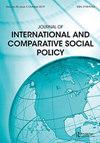科尔皮和帕尔梅的“再分配悖论”二十年后:到目前为止,我们学到了什么?我们从哪里得到了它?
Q2 Social Sciences
Journal of International and Comparative Social Policy
Pub Date : 2021-01-12
DOI:10.1017/ics.2020.24
引用次数: 7
摘要
二十多年前,Korpi和Palme(1998)发表了社会政策学科史上最具影响力的论文之一,他们提出了一个“再分配悖论”:越多的国家将福利资源专门针对穷人,实际实现的再分配就越少,收入不平等和贫困的减少就越少。本文对这一悖论的实证研究进行了最新的回顾。更具体地说,我们将这一悖论分解为七个核心假设,它们共同构成了一条从制度设计到再分配结果的因果链。对于每一个因果假设,我们都对相关的实证文献进行了全面和批判性的回顾,还包括更广泛的研究,这些研究并不旨在解决Korpi和Palme悖论本身,但仍然提供了有关它的信息。本文章由计算机程序翻译,如有差异,请以英文原文为准。
Two decades after Korpi and Palme’s “paradox of redistribution”: What have we learned so far and where do we take it from here?
Abstract Over two decades ago, Korpi and Palme (1998) published one of the most influential papers in the history of social policy discipline, in which they put forward a “paradox of redistribution”: the more countries target welfare resources exclusively at the poor, the less redistribution is actually achieved and the less income inequality and poverty are reduced. The current paper provides a state-of-the-art review of empirical research into that paradox. More specifically, we break down the paradox into seven core assumptions, which together form a causal chain running from institutional design to redistributive outcomes. For each causal assumption, we offer a comprehensive and critical review of the relevant empirical literature, also including a broader range of studies that do not aim to address Korpi and Palme’s paradox per se, but are nevertheless informative about it.
求助全文
通过发布文献求助,成功后即可免费获取论文全文。
去求助
来源期刊

Journal of International and Comparative Social Policy
Social Sciences-Sociology and Political Science
CiteScore
3.70
自引率
0.00%
发文量
18
 求助内容:
求助内容: 应助结果提醒方式:
应助结果提醒方式:


